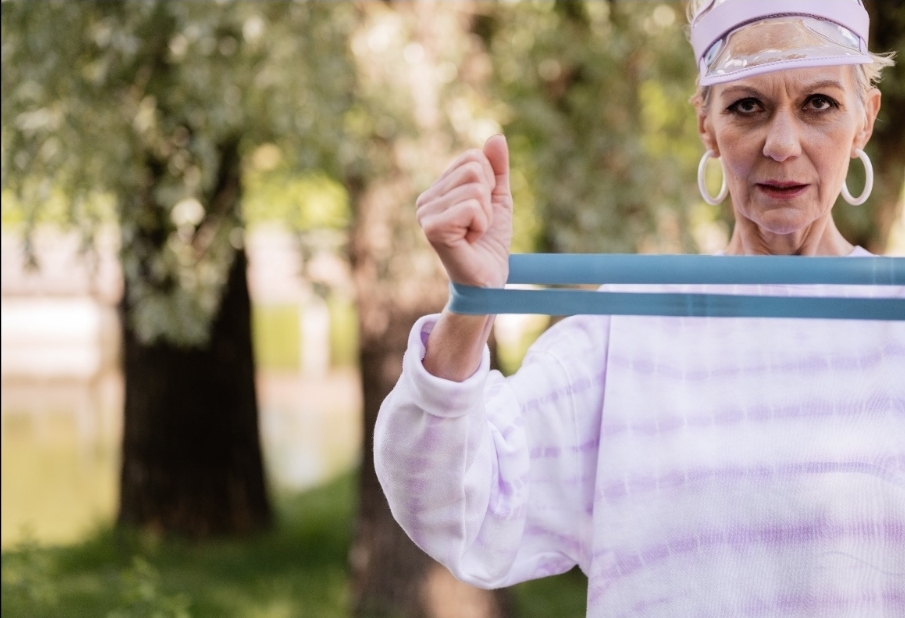As individuals transition into their senior years, maintaining an active lifestyle can become a challenge. Retirement and old age often bring changes in daily routines, sometimes leading to decreased physical activity – it could be due to health issues that accompany old age or even just a lack of motivation because you no longer have to go to work or do as many chores as you did in your younger years. However, staying active is crucial for seniors, as it significantly contributes to overall health, mobility, and quality of life. Regular exercise can help manage health issues, enhance mental well-being, and maintain independence.
This article provides essential fitness and exercise tips tailored for seniors, focusing on safe and effective ways to stay active and healthy. Let’s get started.
- Start with Gentle Warm-Ups
For seniors, beginning an exercise routine with gentle warm-ups is essential to prepare the body and minimize the risk of injuries. Warm-up exercises increase blood flow, raise muscle temperature, and enhance flexibility, all of which are critical for older adults. Start with simple activities like light stretching, arm circles, or a short walk. These activities should be done slowly and carefully to avoid strain. Warm-ups not only prepare the body physically but also mentally for the exercise session ahead.
- Consider a Fitness Program
Engaging in a structured fitness program can provide seniors with guidance and a sense of routine. For those combating conditions like Parkinson’s disease, specialized programs such as RSB or Rock Steady Boxing are beneficial. There are numerous Rock Steady Boxing locations available for seniors aiming to ‘knock out’ Parkinson’s through exercise.” These programs are tailored to address specific health challenges and are led by trained professionals. They offer exercises that improve strength, balance, and flexibility, all of which are crucial for managing Parkinson’s symptoms. Participating in such programs can also provide social interaction and community support, which are valuable for mental health.
- Focus on Balance and Flexibility
Balance and flexibility exercises are particularly important for seniors, as they help prevent falls and maintain functional independence. Activities like yoga, tai chi, or Pilates are excellent for enhancing balance and flexibility. These low-impact exercises can be modified to suit individual fitness levels and can be done at home or in a class setting. Regular practice of these activities improves posture, joint health, and mobility, making daily tasks easier and safer for seniors.
- Incorporate Strength Training
Strength training is vital for seniors to preserve muscle mass and bone density, which naturally decrease with age. Engaging in light weightlifting, using resistance bands, or doing bodyweight exercises like squats and wall push-ups can effectively maintain and build strength. Strength training should be done cautiously, with a focus on proper form to avoid injuries. It’s advisable to start with lighter weights or lower resistance and gradually increase as strength improves. Consult with your physician before starting any intense workout.
- Cardiovascular Health is Key
If there’s one thing all seniors must be concerned about, it’s heart health. Cardiovascular exercises are crucial for seniors, as they strengthen the heart and lungs and improve endurance. For older adults, low-impact cardio activities like brisk walking, swimming, and cycling are excellent choices. These exercises are gentle on the joints while effectively boosting heart health. Regular cardiovascular exercise can also aid in weight management, reduce the risk of chronic diseases, and improve overall energy levels. Seniors should aim for more than 2 hours of moderate-intensity aerobic activity per week, as recommended by health experts, but it’s important to start slowly and increase intensity gradually.
- Stay Hydrated and Listen to Your Body
Did you know seniors should drink at least 1.7 liters of water every day? Staying hydrated is especially important for seniors who exercise, as their bodies may not regulate hydration as efficiently. Drinking water before, during, and after physical activities helps to prevent dehydration, which can lead to fatigue and other health issues. Additionally, seniors should pay close attention to their body’s signals. If they feel pain, dizziness, or excessive fatigue, it’s crucial to stop and rest. Listening to the body and respecting its limits is vital to avoid overexertion and injuries.
- Make it Social and Fun
Social connections can motivate us to stay more active. Exercise can also be a social activity, providing opportunities to connect with others and share enjoyable experiences. Group exercise classes tailored to seniors, such as water aerobics, dance classes, or group walks, offer both physical and social benefits. Participating in these activities can combat loneliness, boost mood, and provide a sense of community. Making exercise fun and social can greatly enhance your commitment to a regular fitness routine.
- Regular Health Check-ups
As mentioned previously, before starting any new exercise regimen, it’s important for seniors to consult with healthcare providers. Regular health check-ups ensure that the chosen activities are safe and appropriate for their health conditions. Doctors can provide personalized exercise recommendations and guidelines based on individual health needs. This step is particularly crucial for seniors with pre-existing conditions or those who have been inactive for a prolonged period.
Conclusion: Age is just a number
Staying active is essential for seniors, not just for physical health but for overall well-being. Start with gentle warm-ups before attempting any vigorous workout. Moreover, consider specialized fitness programs like Rock Steady Boxing, which focus on balance and flexibility exercises.
Incorporating social elements into exercise routines can provide mental and emotional upliftment, and regular health check-ups with professionals ensure that fitness activities are tailored to individual health needs. The activities discussed in this article not only help in managing health conditions and preventing injuries but also provide mental and emotional benefits.
Regular exercise can enhance independence, boost mood, and improve the quality of life for older adults. It’s never too late to start an exercise routine. By embracing these fitness and exercise tips, seniors can enjoy a higher quality of life with improved physical strength, mental clarity, and social engagement. Ultimately, the goal is not just longevity but a vibrant, active, and fulfilling life in your senior years.
James Martin is a passionate writer and the founder of OnTimeMagazines & EastLifePro. He loves to write principally about technology trends. He loves to share his opinion on what’s happening in tech around the world.



